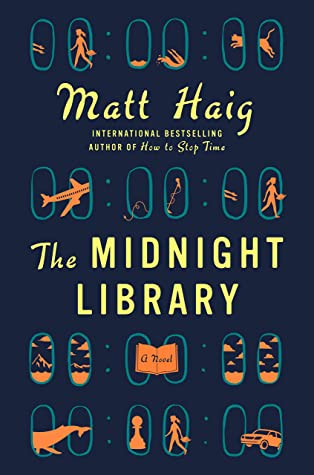Review: Matt Haig’s “The Midnight Library”
by Miles Raymer

Matt Haig’s The Midnight Library is a whimsical yet heavy journey into the ultra-trendy land of multiverse narratives. The protagonist is Nora Seed, a bedraggled Brit who decides to take her own life after her personal shitcake of bad luck gets iced by a particularly lousy day. Instead of fading to black, Nora finds herself in a metaphysical limbo––a library where every book represents an alternate life she could have lived, complete with a deity-like librarian spirit guide. Nora then explores a series of different lives and the lessons they can teach her, with the ultimate goal of discovering whether she has an authentic desire to keep living.
It’s been a while since I had such a mixed reaction to a novel. There’s a lot to like about The Midnight Library. I found the quality of Haig’s writing to be generally inconsistent, but he can be really charming. He is especially good at crafting one-liners or short passages that put a fresh shine on tired truisms. Here are my favorite examples:
A person was like a city. You couldn’t let a few less desirable parts put you off the whole. (48)
Death is the opposite of possibility. (69)
Never underestimate the big importance of small things. (86)
To be part of nature was to be part of the will to live. (134)
Maybe even the most seemingly perfectly intense or worthwhile lives ultimately felt the same. Acres of disappointment and monotony and hurts and rivalries but with flashes of wonder and beauty. Maybe that was the only meaning that mattered. To be the world, witnessing itself. (137-8)
Why want another universe if this one has dogs? (202)
Never trust someone who is willingly rude to low-paid service staff. (204)
Fear was when you wandered into a cellar and worried that the door would close shut. Despair was when the door closed and locked behind you. (215)
You don’t have to understand life. You just have to live it. (218, emphasis his)
It is quite a revelation to discover that the place you wanted to escape to is the exact same place you escaped from. That the prison wasn’t the place, but the perspective. (284)
If reading these passages makes you think The Midnight Library is a kluge of offbeat birthday and get-well-soon card sentiments, you’re sort of right. There are also a lot of fun references to philosophers and the history of philosophy that I enjoyed. Haig has thought long and hard about life and death, and it shows.
I’m less confident about this novel’s narrative coherence. Given that this is fantasy/magical realism with an obnoxious dash of quantum-infused science fiction, I wanted to give Haig latitude to be creative with the premise and its various permutations. But it never quite clicked for me. I think there are a couple main reasons for this.
First, I never warmed up to the novel’s central relationship, which is between Nora and the librarian, Mrs. Elm. Their conversations are clearly supposed to convey Nora’s inner struggle, but are often just distracting or dull, with Nora poking holes in the Midnight Library’s vague and inconsistent rules, and Mrs. Elm giving evasive answers that boil down to: “Stop asking so many questions; we just need it to work that way because Mr. Haig has a story to tell.” This is a complaint I’ve had about a lot of fantasy/magical realism over the years, so may represent my personal biases more than anything else. At any rate, I could tell that the connection between Nora and Mrs. Elm was supposed to be poignant and meaningful, but I never got there.
The second problem was that I found most of Nora’s alternate lives to be frustratingly underdeveloped. Her “visits” tend to be very brief, and include a surprising amount of stilted dialogue with other characters as she awkwardly tries to figure out what’s going on. Additionally, Nora’s “lessons” often felt like repackaged versions of “no life is perfect”––neither novel nor particularly profound. There were a couple notable exceptions, however, that landed their intended psychological gut-punch. So this aspect wasn’t a total failure for me.
As a closing thought, I think it’s helpful to mention that I’ve never been suicidal or chronically depressed, so I don’t really know what those mental states feel like from the inside. The Midnight Library spends a lot of time exploring suicidal ideation and depression, so it’s possible that my lack of experience with these thoughts and feelings precluded a stronger connection to Nora’s story. Folks better acquainted with these difficult aspects of human nature may find the novel more relatable and therefore moving in all the ways Haig intends. In other words, The Midnight Library may be a great book (as many other readers seem to think), but just not a great one for me.
Rating: 5/10